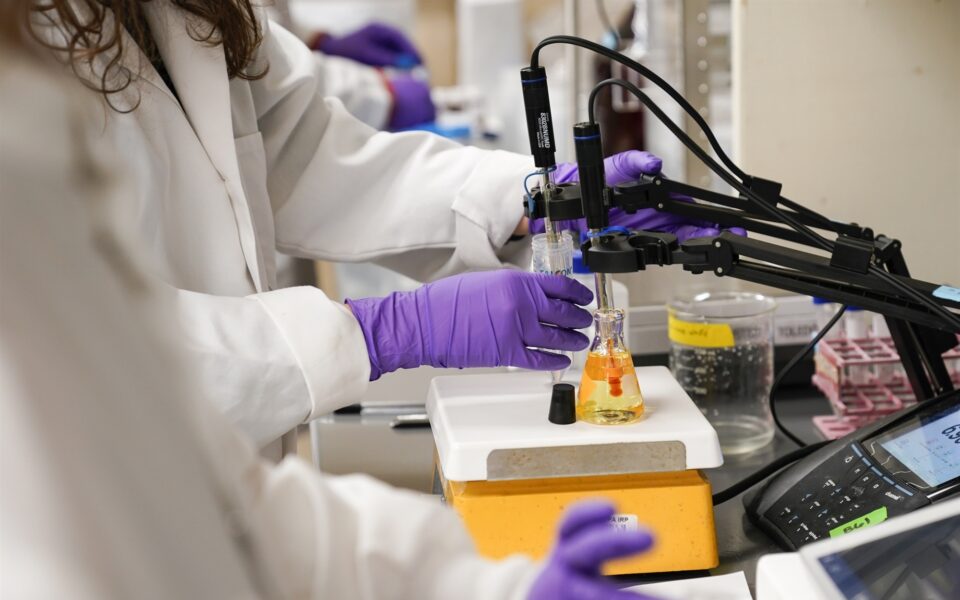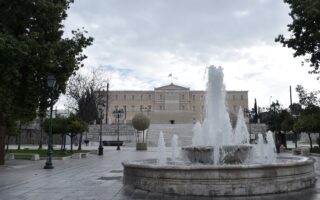Funding for R&D can fuel growth and support democratic institutions in Greece

In July 2022 Professors Konstantinos Drosatos and Nicholas Ktistakis published a letter in Nature, the pre-eminent scientific journal, demanding the creation of a national research foundation in Greece. Forty scientists, including myself, were co-signatories. The letter raised one fundamental issue, namely the lack of systematic funding that would support research in Greece.
Greece’s spending on research and development was 1.3% of GDP just before Covid in 2019. In Germany it was 3.2% of a much larger GDP and the average in the entire OECD was 2.7% of GDP. This huge deficit in R&D effectively limits Greece’s growth potential and ensures a perpetual dependence on relatively low value-added sectors, such as tourism and agriculture. It also makes Greece unattractive for the highest-skilled Greek and foreign researchers. Greece seems to be suffering a form of the curse of middle-income countries: not quite poor but unable to make the extra leap required to join the ranks of the genuinely well-off countries that we like to compare ourselves to.
Many of us have been writing for more than a decade on the importance of reforms that would make investing in Greece easier and more attractive. Much has been done and courageous decisions have been made in the right direction and now we need to push further and change gear to create the transformative conditions needed to escape the middle-income trap. Greece lacks a steady source of funding for basic research. The countries with standards of living we aspire to, such as France, Germany or even the traumatized UK all have explicit budgets, which are available to researchers on a competitive basis, to implement projects of their own imagination and creativity.
The process works like this: The government allocates funding to basic research each year. This is then handed over to independent research councils, who in turn distribute them to researchers following a highly competitive process of proposal evaluation. Proposals are reviewed by experts and ranked. In this way a young researcher starting up their career can obtain €50,000 or €100,000 and a more established researcher can expect much larger amounts. This results in a vibrant research community that produces knowledge and, in the process, can create patents and train people who can join industry with cutting-edge knowledge in their area. In turn this attracts industries and firms that need highly skilled individuals with frontier knowledge. One only needs to look to Paris and London to see examples of the effects of such policy: Tech firms such as DeepMind in London are founded near world-class universities with broad research portfolios from neuroscience to social science. And the biotech industry in the Northeastern US, where many Greek scientist thrive, is another brilliant example of what can be achieved with well-funded research universities such as MIT, Harvard and Yale. What is there to stop Greece competing for such knowledge and innovation other than timidity in promoting research and an investment-friendly environment?
The huge deficit in research and development effectively limits the growth potential of Greece and ensures a perpetual dependence on relatively low value-added sectors
Research funding should support a broad range of fields, including the natural and physical sciences, mathematics, social science, and humanities. I have made the case for the first three. But how are we to promote democracy and understanding of our society and its needs without an excellent understanding of language, literature and history? Who will fund research there? And what about social science? To give an example from one of my areas of interests: There is almost no knowledge base in Greece about child development across the spectrum of the income distribution. There is no data or indeed research that can provide a systematic understanding of how children progress from birth to the end of adolescence in Greece. And when it comes to understanding achievement levels of marginalized groups, such as children from lower-income families, recent migrants, and refugees, we are completely in the dark. We only see the low performance in the PISA study but, with some brilliant exceptions from the University of Crete for example, there are few if any systematic studies or micro-level data. And one of the reasons is the lack of research funding. Many ambitious researchers just give up and leave, offering up their creativity for the benefit of other countries, while others who stay in Greece make do with what they can obtain, usually from abroad or from the EU.
A generous and stable system of funding for research, with minimal year-to-year fluctuations will strengthen the research of local scientists and eventually attract Greek scientists of all fields back to Greece, promoting skill development and innovation at the highest level. This will promote growth, support policy with a strong evidence base and strengthen the institutions of democracy. The first transformational step in modern Greek growth took place in the postwar period and was fueled by investment in infrastructure and in education. The next transformational step has to be the promotion of a knowledge-based economy, fueled by research and development.
Costas Meghir is Douglas A. Warner III Professor of Economics at Yale University, a research associate at the National Bureau of Economic Research (NBER), and a research fellow of the Institute for Fiscal Studies (IFS).





